What's the Difference Between Commercial Cleaning and Sanitizing?
February 02, 2021
Being on top of germs during a pandemic and trying to maintain a hygienic workplace is, without a doubt, a top priority for businesses that want to provide their employees, clients and customers a worry-free atmosphere.
That's why if you're a facility manager, administrator, or business owner, you need to know what type of services a company provides before contacting them so you can avoid unexpected results. We're here to help you make an informed decision before you hire a cleaning company when you really wanted a sanitizing and disinfecting company or vice versa—you might even need both!
Throughout your search, you might see keywords such as cleaning, sanitizing, and disinfecting and you might be thinking, "what's the difference?" Well, knowing the differences has been one of the most widely searched topics throughout the pandemic, so we'll briefly break down their meanings, but focus primarily on the differences between commercial cleaning and
Commercial Sanitizing And Disinfecting services.
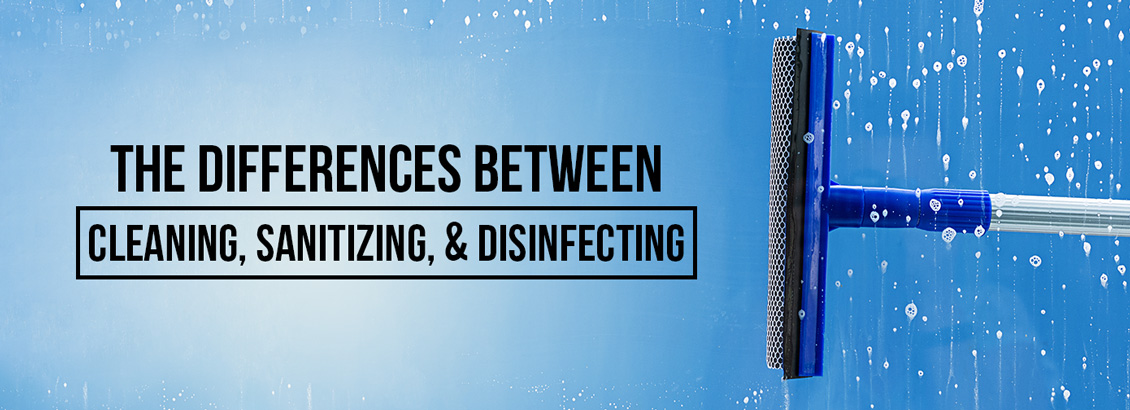
They All Seem So Similar?
As we mentioned earlier, there's been quite some confusion on knowing the differences between, cleaning, sanitizing and disinfecting. Hopefully, breaking down the overlapping characteristics will help clear up some of the confusion, so you'll know exactly what to expect.
Cleaning: On the surface (pun intended), you'd think we'd all know what cleaning entails. Yes, cleaning is the act of making things look "clean" by organizing things and physically wiping down surfaces using soap and water, but we tend to forget what is physically happening. When you clean, you're physically removing organic and inorganic materials, dirt, contaminants, and impurities off of a surface.
Cleaning only physically removes what you can see (dirt) and can't see (germs) but it doesn't significantly kill germs. If you want to reduce the number of germs that are present on a surface, then we'd have to go up one notch with our efforts and sanitize the surface.
Sanitizing: Reduces the number of germs to a safe level but does not kill them greatly in number, and the opportunity for germ reproduction is still present. Sanitizing can be achieved with natural methods using a simple mixture of white vinegar and lemon juice, for example, or can be achieved with chemicals. Now, sanitizers made with chemicals are diluted to be at a strength that is gentle enough for your surfaces, but as mentioned earlier, creates an opportunity for germs to reproduce. To ensure maximum results, disinfection is required to greatly reduce and eliminate the presence of pathogens.
Disinfecting: This approach will significantly reduce the numbers of germs, bacteria, fungi, and viruses present on a surface at a kill rate of 99.999% or more, and the results you get with disinfection are near sterilization. Disinfectants are chemicals and all disinfectants must be registered with the EPA. They are to be used on hard surfaces or objects and cannot be applied on surfaces that come in contact with food because of their concentration level. What makes disinfection much more effective than sanitizing is the strength to which it is applied.
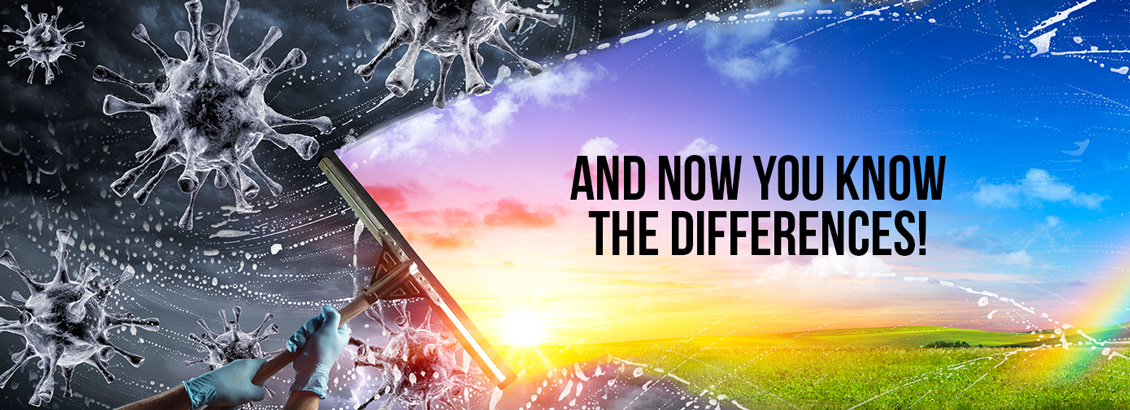
Using hypochlorous acid (HOCl) as an example, to make it an effective broad-spectrum disinfectant, it would have to be applied at a strength of at least 500 parts per million (ppm) or more. To make it a sanitizer, a technician would have to dilute the solution to 200 ppm to make it suitable for food contact surfaces. It sounds confusing, but that's why we leave sanitization and disinfection up to the professionals.
These three concepts overlap each other, and together, all three of them can create cleaner and more hygienic environments for your facility. You cannot sanitize or disinfect surfaces and get the results you want without cleaning first. Also, you can't expect a germ-free environment right after you clean because you need to sanitize and disinfect to actually reduce or help eliminate the germs that exist on your surfaces.
Not all surfaces should be disinfected either! A technician should know that food contact surfaces should only be sanitized and not disinfected and that high-touch areas of concern should be disinfected, not sanitized. There was your crash course on knowing the differences among these terms and hopefully, you'll know what to look for throughout your search for commercial services.
Need Hygienic Services? Know What to Look for
As someone who is looking for commercial services for your facility, it helps to know what a commercial cleaning company does and how that differs from a commercial sanitizing and disinfecting company. Many commercial cleaning companies have a team of specialists who design a plan to help clean your facility. Their scope of work will include general cleaning that the janitorial team might already deploy at your facility but executed in a more methodical and thorough manner.
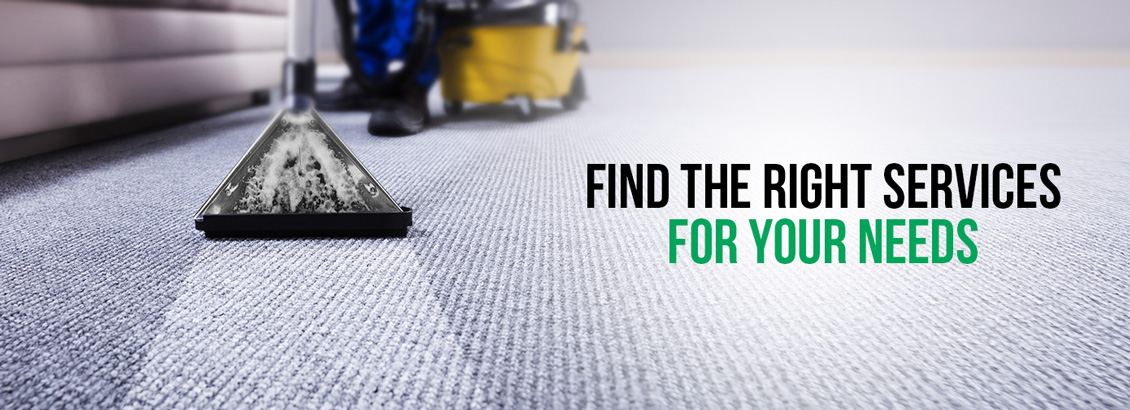
Typically, a commercial cleaning company will handle the vacuuming, mopping, and waxing of floors; they'll also dust the facility's interior and will sanitize (keyword) your bathrooms and break rooms because they are hotspots for germs. Commercial cleaning companies will hit different areas like the tiles, walls, furniture, lighting systems, extract debris from carpet, clean suspended ceilings, windows, dining and kitchen areas, washing facilities and more.
They may even restock your bathrooms with consumables such as toilet paper, soap and hand sanitizing solutions, feminine products, paper towels, and trash liners. Some companies may even provide external services as well to pick up outside litter, remove graffiti, pressure wash your walls, and even basic landscaping to blow out grass and leaves to make your facility look very presentable.
Commercial cleaning companies are specialized in servicing areas that need to maintain a certain level of cleanliness and hygiene such as cleanrooms and research and development facilities, medical facilities, commercial kitchens, industrial facilities, schools, offices, and other places where a clean environment is emphasized and necessary.
Commercial cleaning companies provide sanitizing services as part of their deliverables, but it's not an area they specialize in. It's a part of their cleaning regiment to hit areas of concern and bring the levels of microbial activity down to a safe level in areas that need it most, but it's not their specialty. That's why there are commercial sanitizing and disinfecting companies out there who are specialized in providing your facility with an adequate game plan to help protect it from pathogens, especially during times like these.
Why You Need Commercial Sanitizing and Disinfecting Services
First off, every facility needs to have a strong cleaning regiment in place for sanitizing and disinfecting to truly be effective. This means that before the pandemic, businesses were already using their existing janitorial staff, or maybe a commercial cleaning company, to mechanically clean their facility to look its best. Pre-pandemic cleaning may have included sanitizing common areas such as restrooms and kitchens, but with the pandemic plaguing our society, our approach to cleaning has dramatically changed. These days, every part of your facility must be protected to help mitigate cross-contamination and help reduce the risk of transmitting infectious diseases from a surface to a person.
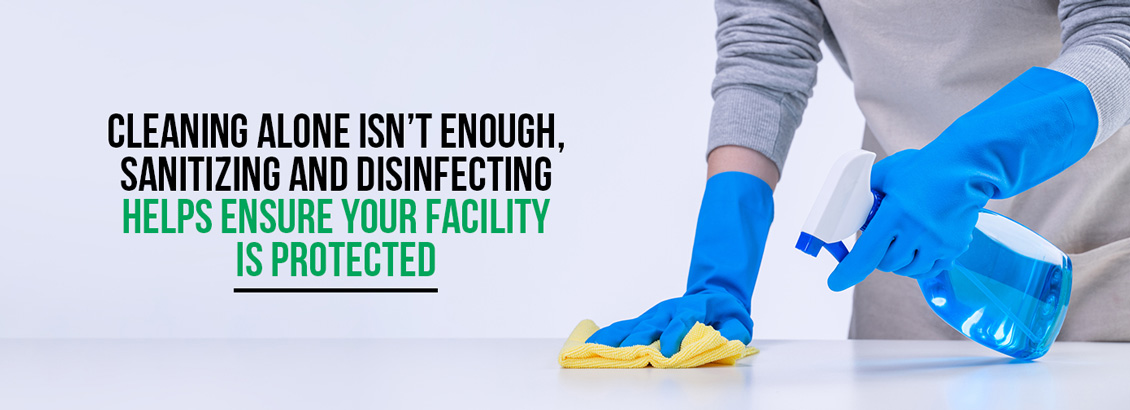
As a facility manager or business owner looking to help protect your workplace environment from germs, viruses and bacteria, you need to hire specialists that focus on this area alone and who do it best. So, choosing a commercial sanitizing and disinfecting company that uses EPA-registered solutions via the use of an electrostatic sprayer helps achieve facility wide protection with even coverage.
Your janitorial team or your commercial cleaning company of choice needs to do their best for proper protection because as we learned earlier, without proper cleaning, you won't experience a truly protected facility. Companies like Germinator are a perfect option in developing a pathogen remediation plan for your facility. We are your commercial sanitization and disinfection experts.
Germinator's Commercial Sanitizing and Disinfecting Services
Since 2015, Germinator has been 100% focused on providing sanitizing and disinfecting services alone. Since then, they have conducted extensive studies based on experiments with other disinfection methods such as ozone, UV light, using hydrogen peroxide and chlorine dioxide, and other quats. Now, they have perfected their process to provide enhanced antimicrobial protection for your commercial facility with their patent-pending process.
When you choose Germinator for your commercial sanitizing and disinfecting needs, you'll get complete and thorough services with an attention to detail that no other disinfection company can provide.
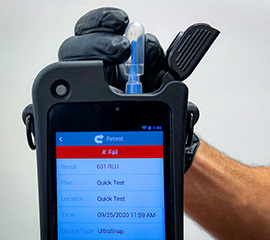
Our technicians will first test your surfaces for ATP using a luminometer to detect the light that can come from cellular activity. This measurement tells our technicians the levels of cleanliness present on your surfaces. From here, a technician can properly benchmark the effectiveness of our commercial sanitizing and disinfecting services.

Next, our technicians will fill up their electrostatic sprayers with our Genesis HOCl solution, which is a broad-spectrum sanitizing and disinfecting treatment. For proper disinfection, our technicians will use Genesis at a disinfecting strength of 500 ppm and for areas that require sanitizing, they'll dilute it to a proper mixture of 200 ppm.
Genesis is effective against a wide variety of pathogens, including
Staphylococcus aureus, MRSA,
Salmonella enterica and
Pseudomonas aeruginosa, and viruses including norovirus, rotavirus and adenovirus on hard, non-porous, environmental surfaces. It meets the Association of Official Agricultural Chemists (AOAC) germicidal spray standards for Hospital Grade Disinfection and is on the EPA N List of products determined to meet the criteria for use against SARS-CoV-2, the virus that causes COVID-19. As a result, this treatment will eliminate bacteria and viruses that may reside in your commercial location without the use of harsh chemicals or fumes.

Our technicians will then apply our Shield solution to every touchpoint and surface within your commercial facility. The Shield is a water-based quaternary ammonium compound that imparts a durable bacteriostatic finish to a wide range of non-food contact surfaces. It is EPA-registered to be effective against the growth of mold, mildew, algae, and odor-causing bacteria. This application creates an invisible barrier that combats deterioration and discoloration and promotes freshness for up to three months.
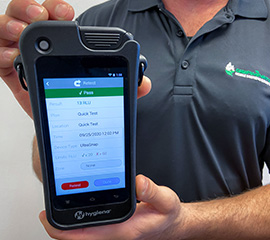
The last step our technicians will do is verify that our solutions and protective services have achieved the intended result. So they'll retest the surfaces within your facility to ensure they are hygienic and have achieved hospital-grade disinfection.
Find a Germinator Franchise Near You
The above is what proper commercial sanitizing and disinfecting looks like, and Germinator offers it at the most competitive prices available with a
Scientific Board that has conducted the research to support their methodology. Commercial cleaning and commercial sanitizing and disinfecting may appear to be the same, but today we've learned that they are two industries that overlap each other but aren't the same.
As a facility manager or business owner looking for services that create hygienic environments, you may want to consider hiring a commercial sanitizing and disinfecting company and revisit how your janitorial team cleans your facility. If you're in need of commercial cleaning, then we highly suggest that you hire a commercial sanitizing and disinfecting company at the same time because during a pandemic, cleaning alone isn't enough.
If you're looking for commercial disinfection services, feel free to call us at
855-NO-GERMZ (664-3769) or fill out the form on this website.





 Next, our technicians will fill up their electrostatic sprayers with our Genesis HOCl solution, which is a broad-spectrum sanitizing and disinfecting treatment. For proper disinfection, our technicians will use Genesis at a disinfecting strength of 500 ppm and for areas that require sanitizing, they'll dilute it to a proper mixture of 200 ppm.
Next, our technicians will fill up their electrostatic sprayers with our Genesis HOCl solution, which is a broad-spectrum sanitizing and disinfecting treatment. For proper disinfection, our technicians will use Genesis at a disinfecting strength of 500 ppm and for areas that require sanitizing, they'll dilute it to a proper mixture of 200 ppm. Our technicians will then apply our Shield solution to every touchpoint and surface within your commercial facility. The Shield is a water-based quaternary ammonium compound that imparts a durable bacteriostatic finish to a wide range of non-food contact surfaces. It is EPA-registered to be effective against the growth of mold, mildew, algae, and odor-causing bacteria. This application creates an invisible barrier that combats deterioration and discoloration and promotes freshness for up to three months.
Our technicians will then apply our Shield solution to every touchpoint and surface within your commercial facility. The Shield is a water-based quaternary ammonium compound that imparts a durable bacteriostatic finish to a wide range of non-food contact surfaces. It is EPA-registered to be effective against the growth of mold, mildew, algae, and odor-causing bacteria. This application creates an invisible barrier that combats deterioration and discoloration and promotes freshness for up to three months. The last step our technicians will do is verify that our solutions and protective services have achieved the intended result. So they'll retest the surfaces within your facility to ensure they are hygienic and have achieved hospital-grade disinfection.
The last step our technicians will do is verify that our solutions and protective services have achieved the intended result. So they'll retest the surfaces within your facility to ensure they are hygienic and have achieved hospital-grade disinfection.